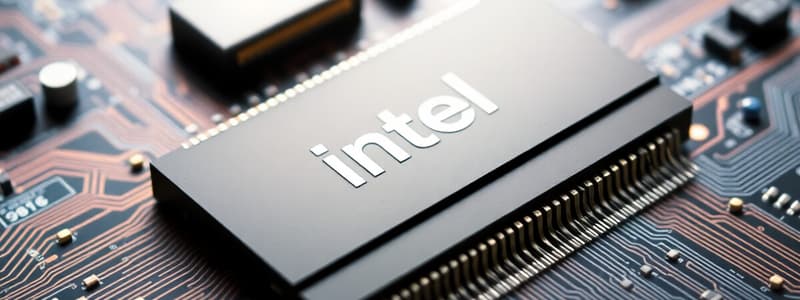Podcast
Questions and Answers
What is the maximum amount of memory that the Intel 8086 microprocessor can access?
What is the maximum amount of memory that the Intel 8086 microprocessor can access?
- 1 MB (correct)
- 512 KB
- 256 KB
- 2 MB
Which component of the Intel 8086 microprocessor handles the actual execution of instructions?
Which component of the Intel 8086 microprocessor handles the actual execution of instructions?
- Instruction queue
- Bus Interface Unit (BIU)
- Address adder
- Execution Unit (EU) (correct)
In which operational modes can the Intel 8086 microprocessor function?
In which operational modes can the Intel 8086 microprocessor function?
- Basic and Advanced
- Single and Dual
- Minimum and Maximum (correct)
- Standard and Custom
What is the word size of the Intel 8086 microprocessor?
What is the word size of the Intel 8086 microprocessor?
What is the purpose of the Instruction Queue in the Intel 8086's Bus Interface Unit?
What is the purpose of the Instruction Queue in the Intel 8086's Bus Interface Unit?
What is the purpose of the AX register in the execution unit?
What is the purpose of the AX register in the execution unit?
Which register is primarily used to access data on the stack?
Which register is primarily used to access data on the stack?
What is the role of the SI register during string operations?
What is the role of the SI register during string operations?
What does the DX register specifically handle during I/O operations?
What does the DX register specifically handle during I/O operations?
Which of the following registers is typically used with the Data Segment register (DS)?
Which of the following registers is typically used with the Data Segment register (DS)?
In the context of memory addressing, what do the pointer and index registers primarily store?
In the context of memory addressing, what do the pointer and index registers primarily store?
What is the main function of the BX register?
What is the main function of the BX register?
Which register is not primarily associated with arithmetic functions?
Which register is not primarily associated with arithmetic functions?
What is the primary purpose of the Destination Index (DI) register in string operations?
What is the primary purpose of the Destination Index (DI) register in string operations?
Which flags in the flag register indicate conditions in the execution unit?
Which flags in the flag register indicate conditions in the execution unit?
What does the Carry Flag (CF) indicate after an addition or subtraction operation?
What does the Carry Flag (CF) indicate after an addition or subtraction operation?
How many active flags are there in the 16-bit flag register of the 8086 execution unit?
How many active flags are there in the 16-bit flag register of the 8086 execution unit?
What is the function of the Zero Flag (ZF)?
What is the function of the Zero Flag (ZF)?
What does the Direction Flag (DF) select during string instructions?
What does the Direction Flag (DF) select during string instructions?
Which of the following flags is used to control the operation of the INTR pin?
Which of the following flags is used to control the operation of the INTR pin?
What kind of information does the Auxiliary Flag (AF) hold after an addition operation?
What kind of information does the Auxiliary Flag (AF) hold after an addition operation?
What is indicated by an overflow when adding signed numbers?
What is indicated by an overflow when adding signed numbers?
Which flag indicates that the sign bit has changed during an arithmetic operation?
Which flag indicates that the sign bit has changed during an arithmetic operation?
How many bytes can the instruction queue in the Bus Interface Unit (BIU) hold?
How many bytes can the instruction queue in the Bus Interface Unit (BIU) hold?
What is the primary function of the code segment in segmented memory?
What is the primary function of the code segment in segmented memory?
What happens when the instruction queue of the BIU is not full?
What happens when the instruction queue of the BIU is not full?
What is the size of each segment in an 8086/88 based system?
What is the size of each segment in an 8086/88 based system?
Which segment is specifically used for storing return addresses?
Which segment is specifically used for storing return addresses?
What is the total amount of physical memory that the CPU 8086 can address?
What is the total amount of physical memory that the CPU 8086 can address?
What is the purpose of the segment registers in the 8086/88 processors?
What is the purpose of the segment registers in the 8086/88 processors?
How does the CS:IP mechanism work in address formation?
How does the CS:IP mechanism work in address formation?
Which of the following segments has a specific register designated for stack operations?
Which of the following segments has a specific register designated for stack operations?
What is the size of each segment in the 8086/88 memory model?
What is the size of each segment in the 8086/88 memory model?
In which configuration is the Extra Segment register (ES) primarily used?
In which configuration is the Extra Segment register (ES) primarily used?
What is the output of the following combination: CS = 34BA and IP = 8AB4?
What is the output of the following combination: CS = 34BA and IP = 8AB4?
Which segment register is used in conjunction with the Base Pointer (BP)?
Which segment register is used in conjunction with the Base Pointer (BP)?
What does the acronym BIU stand for in the context of the 8086 microprocessor?
What does the acronym BIU stand for in the context of the 8086 microprocessor?
Flashcards are hidden until you start studying
Study Notes
Features of Intel 8086 Microprocessor
- 16-bit microprocessor with a 20-bit address bus, capable of addressing 1 MB of memory.
- Supports up to 64K I/O ports and has a word size of 16 bits, double word size of 4 bytes.
- Uses multiplexed address/data bus (AD0-AD15 and A16-A19).
- Operates in two modes: Minimum and Maximum.
- Can prefetch up to 6 instruction bytes from memory, queuing them for faster execution.
- Requires +5V power supply and comes in a 40-pin dual in-line package.
Internal Architecture of 8086
- Comprises two main blocks: Bus Interface Unit (BIU) and Execution Unit (EU).
- BIU is responsible for data and address transactions, instruction fetching, and operand memory access.
- Instruction bytes are transferred to an instruction queue for the EU, which executes the fetched instructions.
Execution Unit Components
- Decodes instructions fetched by the BIU, generates control signals, and executes them.
- Key components include Control Circuitry, Instruction Decoder, and Arithmetic Logic Unit (ALU).
General Purpose Registers
- AX, BX, CX, and DX registers are 16 bits, split into lower (AL, BL, CL, DL) and upper halves (AH, BH, CH, DH).
- Registers are used for various arithmetic, I/O, and data storage functions.
Pointer and Index Registers
- SP (Stack Pointer) and BP (Base Pointer) are used with the Stack Segment (SS) for managing stack operations.
- SI (Source Index) and DI (Destination Index) are utilized in string operations, often associated with the Data Segment (DS) and Extra Segment (ES).
Flag Register
- Contains 16 bits, with 9 active flags; reflects conditions from instruction execution and controls EU operations.
- Status flags include Carry (CF), Parity (PF), Auxiliary (AF), Zero (ZF), Sign (SF), and Overflow (OF).
- Control flags include Trap (TF), Interrupt (IF), and Direction (DF).
Instruction Queue and Pipelining
- BIU features a 6-byte instruction queue allowing pre-fetching of instruction bytes, facilitating a pipelining architecture.
- When the queue has space, it can look ahead to retrieve upcoming instructions.
Segmented Memory Organization
- Memory is logically segmented into four 64KB segments: Code, Data, Extra, and Stack.
- Each segment serves specific functions, with addresses generated by segment registers.
Segment Registers
- Four segment registers: Code Segment (CS), Data Segment (DS), Extra Segment (ES), and Stack Segment (SS) all store upper 16 bits of segment addresses.
Memory Address Generation
- Physical addresses are generated using segment registers and offset values, combining 20 bits of address space.
- Example CS:IP address formation illustrates the process of address generation using hexadecimal shifting.
Summary of Registers and BIU Interaction
- Registers include AX, BX, CX, DX, SP, BP, SI, DI, with the BIU managing instruction fetching and execution.
- The execution is coordinated through a pipeline potentially leveraging both the EU and BIU for efficient processing of commands.
Studying That Suits You
Use AI to generate personalized quizzes and flashcards to suit your learning preferences.




